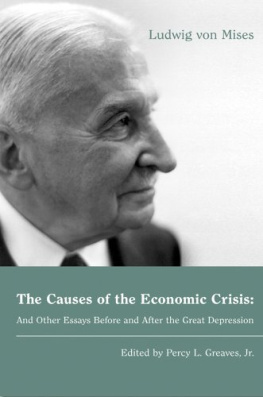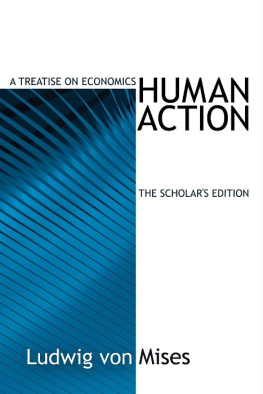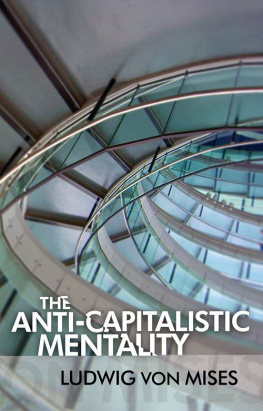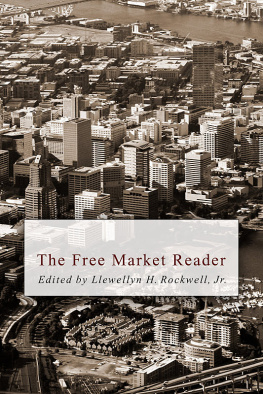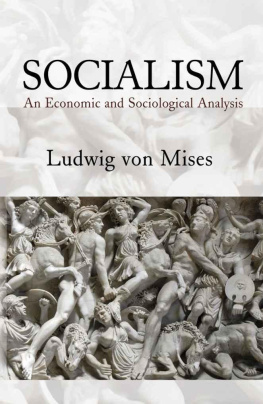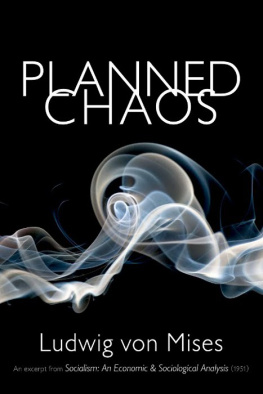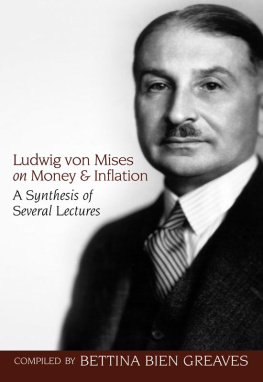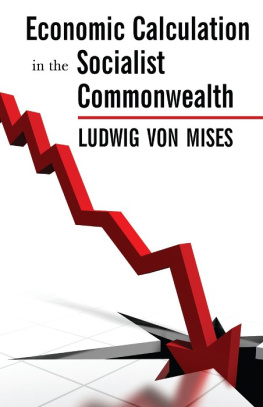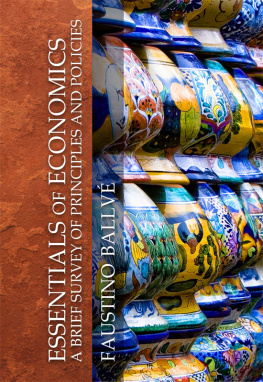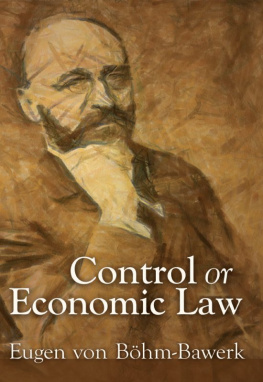Ludwig von Mises - The Causes of the Economic Crisis: And Other Essays Before and After the Great Depression
Here you can read online Ludwig von Mises - The Causes of the Economic Crisis: And Other Essays Before and After the Great Depression full text of the book (entire story) in english for free. Download pdf and epub, get meaning, cover and reviews about this ebook. year: 2003, publisher: Ludwig von Mises Institute, genre: Science. Description of the work, (preface) as well as reviews are available. Best literature library LitArk.com created for fans of good reading and offers a wide selection of genres:
Romance novel
Science fiction
Adventure
Detective
Science
History
Home and family
Prose
Art
Politics
Computer
Non-fiction
Religion
Business
Children
Humor
Choose a favorite category and find really read worthwhile books. Enjoy immersion in the world of imagination, feel the emotions of the characters or learn something new for yourself, make an fascinating discovery.
- Book:The Causes of the Economic Crisis: And Other Essays Before and After the Great Depression
- Author:
- Publisher:Ludwig von Mises Institute
- Genre:
- Year:2003
- Rating:4 / 5
- Favourites:Add to favourites
- Your mark:
- 80
- 1
- 2
- 3
- 4
- 5
The Causes of the Economic Crisis: And Other Essays Before and After the Great Depression: summary, description and annotation
We offer to read an annotation, description, summary or preface (depends on what the author of the book "The Causes of the Economic Crisis: And Other Essays Before and After the Great Depression" wrote himself). If you haven't found the necessary information about the book — write in the comments, we will try to find it.
Ludwig von Mises: author's other books
Who wrote The Causes of the Economic Crisis: And Other Essays Before and After the Great Depression? Find out the surname, the name of the author of the book and a list of all author's works by series.
The Causes of the Economic Crisis: And Other Essays Before and After the Great Depression — read online for free the complete book (whole text) full work
Below is the text of the book, divided by pages. System saving the place of the last page read, allows you to conveniently read the book "The Causes of the Economic Crisis: And Other Essays Before and After the Great Depression" online for free, without having to search again every time where you left off. Put a bookmark, and you can go to the page where you finished reading at any time.
Font size:
Interval:
Bookmark:
THE ECONOMIC CRISIS
AND AFTER THE GREAT DEPRESSION
Edited by Percy L. Greaves, Jr.


CYCLICAL POLICY TO ELIMINATE ECONOMIC FLUCTUATIONS
STABILIZATION OF THE PURCHASING POWER OF THE MONETARY UNIT AND ELIMINATION OF THE TRADE CYCLE
S tabilization of the purchasing power of the monetary unit would also lead, at the same time, to the ideal of an economy without any changes. In the stationary economy there would be no ups and downs of business. Then, the sequence of events would flow smoothly and steadily. Then, no unforeseen event would interrupt the provisioning of goods. Then, the acting individual would experience no disillusionment because events did not develop as he had assumed in planning his affairs to meet future demands.
First, we have seen that this ideal cannot be realized. Second, we have seen that this ideal is generally proposed as a goal only because the problems involved in the formation of purchasing power have not been thought through completely. Finally, we have seen that even if a stationary economy could actually be realized, it would certainly not accomplish what had been expected. Yet neither these facts nor the limiting of monetary policy to the maintenance of a pure gold standard mean that the political slogan, Eliminate the business cycle, is without value.
It is true that some authors, who dealt with these problems, had a rather vague idea that the stabilization of the price level was the way to attain the goals they set for cyclical policy. Yet cyclical policy was not completely spent on fruitless attempts to fix the purchasing power of money. Witness the fact that steps were undertaken to curb the boom through banking policy, and thus to prevent the decline, which inevitably follows the upswing, from going as far as it would if matters were allowed to run their course. These effortsundertaken with enthusiasm at a time when people did not realize that anything like stabilization of monetary value would ever be conceived of and sought afterled to measures that had far-reaching consequences.
We should not forget for a moment the contribution which the Currency School made to the clarification of our problem. Not only did it contribute theoretically and scientifically but it contributed also to practical policy. The recent theoretical treatment of the problemin the study of events and statistical data and in politicsrests entirely on the accomplishments of the Currency School. We have not surpassed Lord Overstone so far as to be justified in disparaging his achievement.
Many modern students of cyclical movements are contemptuous of theorynot only of this or that theory but of all theoriesand profess to let the facts speak for themselves. The delusion that theory must be distilled from the results of an impartial investigation of facts is more popular in cyclical theory than in any other field of economics. Yet, nowhere else is it clearer that there can be no understanding of the facts without theory.
Certainly it is no longer necessary to expose once more the errors in logic of the Historical-Empirical-Realistic approach to the social sciences. Only recently has this task been most thoroughly undertaken once more by competent scholars. Nevertheless, we continually encounter attempts to deal with the business cycle problem while presumably rejecting theory.
In taking this approach one falls prey to a delusion which is incomprehensible. It is assumed that data on economic fluctuations are given clearly, directly and in a way that cannot be disputed. Thus it remains for science merely to interpret these fluctuationsand for the art of politics simply to find ways and means to eliminate them.
All business establishments do well at times and badly at others. There are times when the entrepreneur sees his profits increase daily more than he had anticipated and when, emboldened by these windfalls, he proceeds to expand his operations. Then, due to an abrupt change in conditions, severe disillusionment follows this upswing, serious losses materialize, long established firms collapse, until widespread pessimism sets in which may frequently last for years. Such were the experiences which had already been forced on the attention of the businessman in capitalistic economies, long before discussions of the crisis problem began to appear in the literature. The sudden turn from the very sharp rise in prosperityat least what appeared to be prosperityto a very severe drop in profit opportunities was too conspicuous not to attract general attention. Even those who wanted to have nothing to do with the business world's worship of filthy lucre could not ignore the fact that people who were, or had been considered, rich yesterday were suddenly reduced to poverty, that factories were shut down, that construction projects were left uncompleted, and that workers could not find work. Naturally, nothing concerned the businessman more intimately than this very problem.
If an entrepreneur is asked what is going on hereleaving aside changes in the prices of individual commodities due to recognizable causeshe may very well reply that at times the entire price level tends upward and then at other times it tends downward. For inexplicable reasons, he would say, conditions arise under which it is impossible to dispose of all commodities, or almost all commodities, except at a loss. And what is most curious is that these depressing times always come when least expected, just when all business had been improving for some time so that people finally believed that a new age of steady and rapid progress was emerging.
Eventually, it must have become obvious to the more keenly thinking businessman that the genesis of the crisis should be sought in the preceding boom. The scientific investigator, whose view is naturally focused on the longer period, soon realized that economic upswings and downturns alternated with seeming regularity. Once this was established, the problem was halfway exposed and scientists began to ask questions as to how this apparent regularity might be explained and understood.
Theoretical analysis was able to reject, as completely false, two attempts to explain the crisisthe theories of general overproduction and of underconsumption. These two doctrines have disappeared from serious scientific discussion. They persist today only outside the realm of sciencethe theory of general overproduction, among the ideas held by the average citizen; and the underconsumption theory, in Marxist literature.
It was not so easy to criticize a third group of attempted explanations, those which sought to trace economic fluctuations back to periodic changes in natural phenomena affecting agricultural production. These doctrines cannot be reached by theoretical inquiry alone. Conceivably such events may occur and reoccur at regular intervals. Whether this actually is the case can be shown only by attempts to verify the theory through observation. So far, however, none of these weather theories has successfully passed this test.
A whole series of a very different sort of attempts to explain the crisis are based on a definite irregularity in the psychological and intellectual talents of people. This irregularity is expressed in the economy by a change from confidence over the future, which inspires the boom, to despondency, which leads to the crisis and to stagnation of business. Or else this irregularity appears as a shift from boldly striking out in new directions to quietly following along already well-worn paths.
Font size:
Interval:
Bookmark:
Similar books «The Causes of the Economic Crisis: And Other Essays Before and After the Great Depression»
Look at similar books to The Causes of the Economic Crisis: And Other Essays Before and After the Great Depression. We have selected literature similar in name and meaning in the hope of providing readers with more options to find new, interesting, not yet read works.
Discussion, reviews of the book The Causes of the Economic Crisis: And Other Essays Before and After the Great Depression and just readers' own opinions. Leave your comments, write what you think about the work, its meaning or the main characters. Specify what exactly you liked and what you didn't like, and why you think so.

